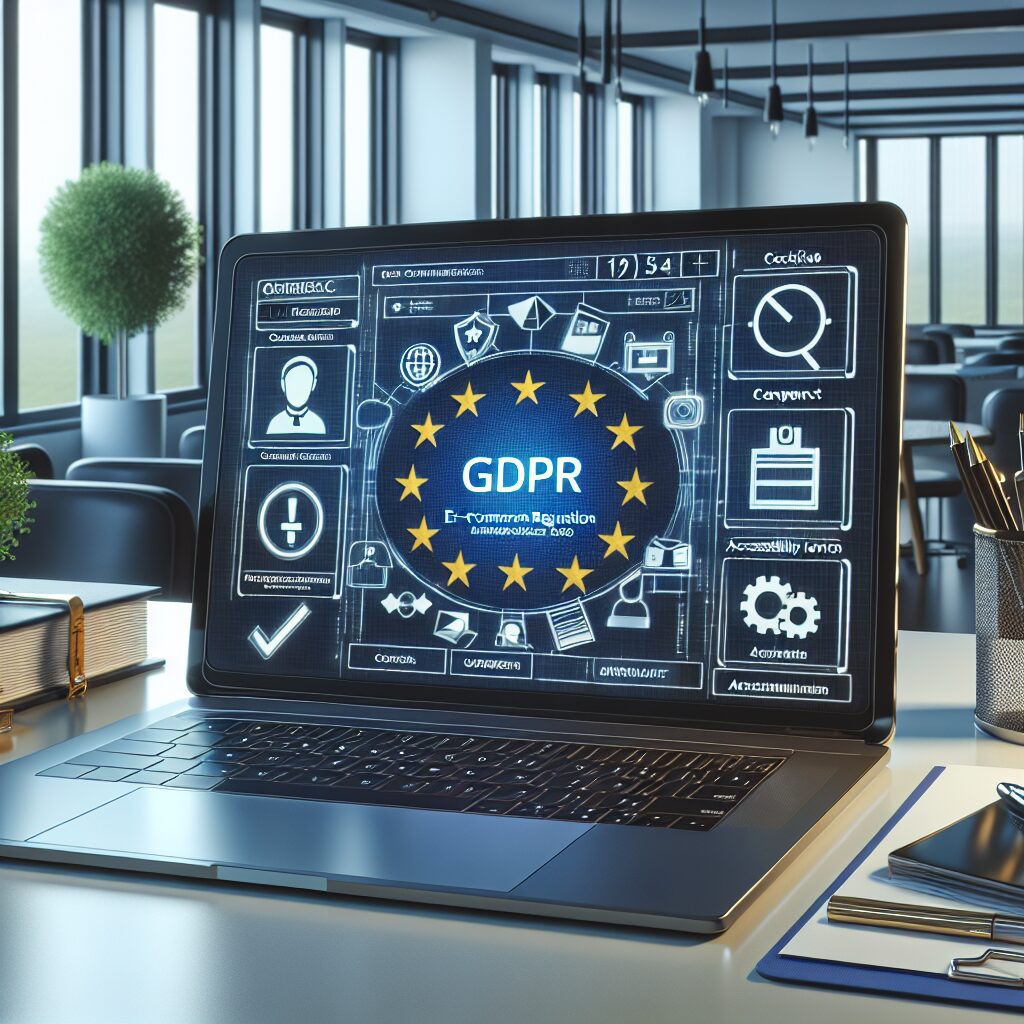About eldris
At Eldris, we automate SEO, multilingual site expansion, and EU compliance for brands scaling across Europe. Our AI-powered platform handles everything from content publishing to regulatory docs—so you don’t have to.
In This Article
- Implement clear internal policies and regular audits.
- Invest in advanced digital tools to streamline compliance.
- Engage with industry experts and utilise Read a related article for insights.
- Focus on continuous training and development for all staff.
- Monitor regulatory changes to maintain high standards of EU compliance.
Introduction to EU Compliance
Key Concepts in EU compliance
EU compliance is essential for businesses operating within stringent European standards. Many companies invest significant resources to achieve EU compliance and maintain robust governmental standards. Our discussion on EU compliance focuses on meeting requirements, optimising processes, and enhancing competitiveness. Adopting comprehensive EU compliance protocols can reduce risks and improve operational transparency. We emphasise EU compliance as a foundation for corporate credibility while reinforcing industry benchmarks. Business leaders must prioritise EU compliance and devote efforts to uphold demanding regulatory frameworks. Integrating EU compliance into daily practices strengthens trust with regulators and partners. Furthermore, embracing EU compliance inspires innovation and sustainable progress across sectors. Companies that excel in EU compliance often report higher customer satisfaction and market success. Overall, utilising strategies for effective EU compliance remains our company’s top priority.

Strategies for Effective Compliance
EU compliance: Strategies and Solutions
Organisations must adopt clear procedures that ensure EU compliance and reduce risks. Firstly, defining internal policies and procedures helps staff adhere to the prescribed regulations. Moreover, updated training sessions and regular audits optimise performance and support EU compliance effectively. In addition, utilising digital tools streamlines processes; for instance, exploring resources such as Learn more about Compliance & Regulation for European Business complements strategic initiatives. Equally important, businesses benefit from comparing notes with industry experts via platforms like Compare global business regulations with the World Bank’s Doing Business report. Consequently, a proactive approach to EU compliance creates a resilient framework that adapts to emerging standards.
“Proactive management and continuous improvement are the cornerstones of successful EU compliance.” – An Industry Insider
Key Takeaways & Next Steps
In conclusion, businesses that integrate detailed policies, regular training, and robust internal checks tend to succeed in achieving outstanding EU compliance. Furthermore, organisations should not hesitate to invest in cutting-edge technologies and consult industry experts to foster continuous growth. As companies transition to more modern practices, they benefit by realising efficiency gains and increased customer trust. Ultimately, taking timely steps paves the way to sustained regulatory adherence and enhanced market reputation.
Understanding GDPR
Understanding GDPR is vital as it intersects closely with broader EU compliance requirements. Organisations need to understand the legal framework and data protection principles underlying the regulation. Moreover, companies must enforce robust measures to safeguard personal data and ensure accountability. In practice, complying with GDPR reinforces a business’s commitment to transparency and security. Additionally, maintaining frequent reviews of data processing systems is essential to limit risks. Such diligence not only satisfies regulators but also builds consumer trust and competitive advantage in the marketplace.
In order to integrate GDPR effectively, firms should collaborate with legal experts and invest in training programmes. As a result, staff remain well-informed regarding data subject rights and emerging enforcement trends. The progressive approach to GDPR also contributes to overall EU compliance, thereby ensuring that all operational procedures meet the highest industry standards.
Leveraging AI for Compliance
Leveraging AI represents a cutting-edge approach to achieving superior EU compliance outcomes. Smart algorithms can monitor regulatory updates and flag potential issues before they escalate. Furthermore, artificial intelligence assists in real-time data analysis that underpins decision-making and operational agility. Businesses that employ AI-based systems gain a competitive edge by swiftly adapting to new directives. Additionally, seamlessly integrating AI solutions with existing platforms – such as those referenced via [INSERT_INTERNAL_LINK_2] – ensures cohesive compliance strategies. In this way, cutting-edge technology not only enhances efficiency but also bolsters accuracy in meeting regulation demands.
Moreover, organisations have observed that AI streamlines reporting procedures and reduces human error considerably. As companies invest in these technologies, they foster a culture of innovation grounded in rigorous compliance practices. Ultimately, adopting AI enhances a company’s posture in the competitive global market while contributing significantly to overall EU compliance.
Regulatory Challenges
Regulatory challenges are common when businesses navigate complex frameworks of EU compliance. Small and large firms alike encounter multifaceted obstacles that demand continuous adaptation. Nonetheless, remaining informed about legislative changes is crucial. Therefore, companies must invest in professional guidance and regular training to keep pace with evolving regulations. In addition, establishing dedicated compliance teams helps organisations address challenges methodically. Through proactive monitoring and prompt rectification, businesses can avoid costly penalties and maintain operational smoothness.
Moreover, companies often experience transitional difficulties and resource limitations during periods of regulatory change. Hence, adopting a step-by-step approach ensures that all pertinent aspects are considered before implementing new policies. By focusing on robust process management, organisations can overcome these hurdles and reinforce their commitment to EU compliance.
Best Practices Overview
Best practices in EU compliance encompass a range of well-defined strategies and continuous improvements. Organisations must develop clear documentation, establish regular feedback cycles, and ensure all employees understand their roles. Additionally, benchmarking against industry standards enables a company to identify areas of improvement promptly. It is also advisable to conduct frequent internal reviews and audits to assess the effectiveness of compliance strategies. As a result, many firms report increased efficiency and reduced error margins when they adhere to best practices consistently.
Furthermore, collaboration across departments enhances accountability and expertise. Engaging with external consultants can provide fresh insights that further refine best practices. Ultimately, a systematic approach not only meets regulatory requirements but also paves the way for sustainable business growth.
Future of EU Regulations
The future of EU regulations appears dynamic and transformative. Policy makers continue to update guidelines to address new challenges emerging in technology and global trade. Consequently, businesses must prepare for further refinements in EU compliance standards. In addition, a forward-looking perspective helps companies allocate resources efficiently for upcoming changes. Many experts forecast a significant shift in regulatory focus towards sustainability and digital transformation, which will influence future compliance strategies. Therefore, continuous monitoring of regulatory trends remains indispensable.
Moreover, organizations that invest in predictive analytics can anticipate changes and reformulate their strategies accordingly. This proactive planning not only mitigates potential risks but also secures a leadership position in a competitive market. As businesses look ahead, prioritising future-proof methods will become a core element of EU compliance.
Compliance Automation Tools
Compliance automation tools are transforming the way businesses approach EU compliance. These tools simplify repetitive tasks and ensure that updates occur in real time. Additionally, automation minimises the risk of human error while enhancing consistency in reporting. Many companies now rely on sophisticated software to conduct audits and track regulatory changes continuously. In turn, this results in reduced operational costs and improved overall efficiency. For instance, integrating automation platforms with existing systems helps organisations stay ahead of compliance requirements.
Furthermore, advanced automation systems offer robust dashboards and alert functionalities. Businesses benefit from timely notifications and data-driven insights, which streamline remediation actions. Ultimately, investing in compliance automation is a prudent measure that contributes significantly to maintaining high EU compliance standards.
Expert Insights
Expert insights reveal that maintaining EU compliance demands both strategic foresight and tactical precision. Industry veterans suggest that continuous staff training and transparent communication channels are paramount. Moreover, a collaborative approach that involves both leadership and operational teams deepens regulatory understanding. Experts also highlight the importance of regular reviews and technological upgrades. In many cases, a proactive strategy prevents regulatory breaches and ensures seamless integration of new policies. Consequently, organisations that harness industry expertise tend to secure long-term operational success.
Great guide on eldris-compliance-solutions-ensuring-your-business-meets-european-standards – Community Feedback
What are the EU compliance standards for businesses?
EU compliance standards include regulations such as GDPR for data protection, the AI Act for artificial intelligence, and other sector-specific guidelines that businesses must follow to operate legally in Europe.
How does Eldris help with GDPR and privacy compliance?
Eldris simplifies GDPR compliance by automating documentation, data handling processes, and monitoring regulatory changes, reducing manual effort and risk.
Which industries need to comply with the EU’s AI Act?
Any business deploying AI-powered solutions that impact EU citizens or operate within EU boundaries must comply with the new AI Act, regardless of industry.
What is the difference between an EU directive and a decision?
An EU directive sets results to be achieved, leaving implementation to member states, while a decision is binding on those it is addressed to—such as specific companies or countries.








